Part 1 is serious. Part 2 is sillier. Both, to me, are important. Neither are perfect.
PART ONE
Intro
The UK is facing economic decline, renewed security threats, and an AI inflection point that should prompt reflection about our priorities. Navigating this successfully will require decades of consistent, durable statecraft, investment in hard capabilities, and a steadfast commitment to deepening sovereignty and accelerating progress.
But to secure our material futures, I’m beginning to think we first need to revive something deeper.
In a secular, rationalist and increasingly atomistic society, we’ve lost many traditional sources of binding, higher purpose. Increasingly I think this means we lack not only individual, spiritual fulfillment, but also a durable, collective consensus for progress.
The old sources — tradition, religion, country — can speak to awe, the surreal, beauty, wonder, belonging, and place, but for many are too irrelevant, inconsistent, or contested to underpin collective purpose.
Many fellow champions of progress perhaps see the pursuit of science and tech progress as a source of purpose itself. But I think there’s something missing.
We need a new national story, a refounding. We need to craft new myths and institutions that not only inspire progress but also a deeper sense of place, connection, and meaning along the way.
Over the last couple of years, as well as caring more about our national trajectory as the stakes of decline become ever clearer, I’ve developed a deeper connection to this land, its lore and folk histories. It not only offers a source of higher meaning, but also a potential backdoor to a broad-based, intentional, liberal patriotism that goes beyond the sort of latent, patriotic revealed preference I suspect many feel today. This reassertion of national purpose and collective identity is essential to underpin a new, durable consensus for science, technology and economic progress.
These two strands — science and tech progress, and a deep connection to British land and lore — may initially feel disparate. But they are not only twinned by magic, alchemy, weirdness and variance, they can help us deepen our connection to this place and one another. With a wider sense of national purpose, we can create a more durable cultural consensus to navigate choppy waters ahead.
The need for a new story
This government has championed a ‘decade of national renewal’. I would love to see this promise live up to all of the spiritual and cultural implications it entails, rather than being reducible solely to policy reforms and infrastructure projects (necessary though they are).
National renewal should be about building a durable coalition for progress that’s bonded by purpose, spirit and belonging, not just transactional, contingent, short-term incentive alignment.
The moment has come for a refounding, not only due to the decline of higher purpose, but also because we’re caught in the liminal space between a fractured national spirit and the onrushing upheaval of a new geopolitical, post-AI order.
In Revolt of the Public, Martin Gurri writes of how the sclerotic public institutions of today's developed economies are a legacy of the industrial age. In this era, states derived their authority from a monopoly on access to information, administering a sort of 'political Taylorism' of top-down bureaucracy. Now, a decentralised tsunami of information and the attendant transferal of power has not only disrupted old institutions, but impeded new ones being built. As Gurri writes, the "mirror [in which] we see ourselves...has fallen and shattered, and the public now inhabits the broken pieces on the floor." The task now is not just tearing down legacy structures, but building something new, substantial and enduring.
I’ve never been a huge royalist, but when the Queen died and that thread of history had been severed, I found a new appreciation for the pull of tradition and the need for durable institutions that outlive and steward us through time. If the internet and information abundance enabled the latest wave of institutional and national introspection, then even extremely cautious expectations about AI timelines should demand an even bigger reflection.
Alexander Karp and Nicholas Zamiska’s new book, The Technological Republic: Hard Power, Soft Belief, and the Future of the West, is maybe the best and grandest attempt I’ve seen to diagnose the coming technological upheaval and synthesise science and technology progress with a distinctly national project.
I managed to see a copy pre-launch, and whatever partisan leanings you expect, I urge you to give it a read. It eviscerates the spurious complacency of many technologists’ failure to work on and take responsibility for projects of major importance; argues that “the market is a powerful engine of destruction, creative and otherwise, but it often fails to deliver what is most needed at the right time”; and laments how techno-utopianism has devolved “into a narrow and thin utilitarian approach…[where] the vital yet messy questions of what constitutes a good life, which collective endeavors [sic] society should pursue, and what a shared and national identity can make possible have been set aside as the anachronisms of another age”. I suspect people with very different politics to Alexander Karp will find much to agree with here.
More than progress
There are sparks of this spirit in the UK. TBI’s A New National Purpose series long ago made a similar argument. Entrepreneur First, with a different theory of change, has made entrepreneurship high status — a cultural achievement that’s arguably more important than financial returns.
But we need much more of this energy and institutional experimentation, and it cannot only be based on the cold hard logic of production.
If the progress crowd — the boosters, techno-optimists, e/acc, uk/acc, anglofuturist and progress studies types — genuinely care about widening our coalition, then not only do the downstream benefits need to be widely tangible, but the spirit and aesthetics of these movements also need to inspire broader, durable support.
So far, despite rallying a solid base, I think these projects are either failing spiritually or aesthetically. Too often they reduce what matters to pure materialism, offering little higher purpose, while the metallic textures of these futures are often coarse and soulless. Run your finger over the contours and you get brushed steel, dimpled concrete and muted glass, not squishy moss or brittle bark. There is little enchantment, minimal poetry.
Meaning and aesthetics are a way of both attracting and repelling. Not everything can or should be about everything, and often it’s good to repel some people (e.g. free-riders, doomsters, NIMBYs) while attracting others. But especially if you’re explicitly building an aesthetic/cultural project, with rallying visions and in-group identifiers, and you’re only really drawing a fairly narrow (and often v male) group of people, then something is going wrong. It’s not just bad vibes, it means your project won’t scale to underpin the durable, wide consensus necessary to survive contact with reality’s messy tradeoffs. I think this is where a lot of tech/progress-adjacent projects are falling short. (There is also, way too often, an offputtingly fratty culture: ‘are you serious & based, or are you a soft NPC?’)
Another cluster are more focused more on care, community and dignity. They argue that the first group are often silent on much of this — which has more truth than many care to admit. But too often this group has little to say about generating economic prosperity. At best, they’re focused on principle but not power. At worst, they free ride on the invention and execution of others. ‘Tech CEOs need an ethics class’ is just ignorant; ‘tech for good’ is too naff to inspire widely. But softerfutures.xyz or cute/acc? There’s something there.
Effective Altruism is one of the more ambitious attempts to synthesise these strands into a secular higher purpose. But utilitarian welfare-maximising is just so…mid. EA’s equalisation of all lives, everywhere, is laudable in theory, but in practice it shaves off the textures of place, community and personality. It makes life a commodity, a series of fungible units, denying identity and our own humanity. This same philosophy encourages value exchange over relationships, brevity over lyricism. Do not leave the conversational door ajar, just put it in an email! We’re sanding down our minds with microscopic tl;drs, until we’re perfectly, exquisitely smooth-brained.
You cannot build a world on axioms alone. You need texture. Divorcing us from this richness isn’t how you build a movement that inspires.
We need better choices: progress and preservation, based and woke, rational and mystical, metal and moss.
What’s holding us back?
I think a significant amount of the tension comes from tech, policy, and London having these accelerating, centripetal forces that incentivise people to acquire as much of the central currency as possible — money, power, approval — without stepping back and equally advocating for everything else that matters for the good life.
I only recently read CS Lewis’s Inner Ring but I’d strongly recommend it on this point, alongside Sebastian Garren’s excellent critique about CS Lewis’s pessimism on the capacity for technology and applied science to provoke wonder.
Or, if tl;dr, Garry Tan’s take works too:
I mostly ‘touch grass’ by actually touching grass. But over the last ~18 months, I’ve got more interested in ancient sources of meaning — if anything due to the absence of anything equivalent in secular society. Others seem to feel that something is lacking too. Religion is growing not only in US tech and wider society, but also in the UK.
I still struggle with much about religion, but congregation, sermons, rituals, fables, mysticism, guidance, reverence, contemplation and higher purpose? Sign me up. Maybe what I call beauty, awe, wonder & transcendence, others just call God?
And there’s always David Foster Wallace (my emphasis):
You get to consciously decide what has meaning and what doesn’t. You get to decide what to worship.
Because here’s something else that’s weird but true: in the day-to-day trenches of adult life, there is actually no such thing as atheism. There is no such thing as not worshipping. Everybody worships. The only choice we get is what to worship.And the compelling reason for maybe choosing some sort of god or spiritual-type thing to worship–be it JC or Allah, be it YHWH or the Wiccan Mother Goddess, or the Four Noble Truths, or some inviolable set of ethical principles–is that pretty much anything else you worship will eat you alive.If you worship money and things, if they are where you tap real meaning in life, then you will never have enough, never feel you have enough. It’s the truth. Worship your body and beauty and sexual allure and you will always feel ugly. And when time and age start showing, you will die a million deaths before they finally grieve you. On one level, we all know this stuff already. It’s been codified as myths, proverbs, clichés, epigrams, parables; the skeleton of every great story. The whole trick is keeping the truth up front in daily consciousness.
(I realised this the more I thought about traditions like marriage. For a long time I took a fairly postmodern, critical approach, deconstructing the symbols and institutions and rendering it all meaningless. But at some point I decided you can choose to imbue it with meaning. You can choose to believe in the power of symbols, tradition and institutions.)
Where I have always found a reliable well of spiritual refuelling is in nature and art. I have come to love London in many ways, but I will never not find the detachment from nature, the land and the seasons that a modern, urbanised, agglomerative, office-block services-based economy entails deeply depressing. Just over a year ago, I went to an immersive exhibition designed to reconnect you to nature. While the works were beautiful, nothing felt more isolating and disconnecting than strapping on a VR headset to transport yourself to a dense forest world.
I like my work, but I do envy the sense of stewardship and connection felt by those who have worked the land. I wonder if a connection to nature and folk/spiritual heritage could be the backdoor to collective national purpose — and thereby a durable consensus for progress — that we’re missing.
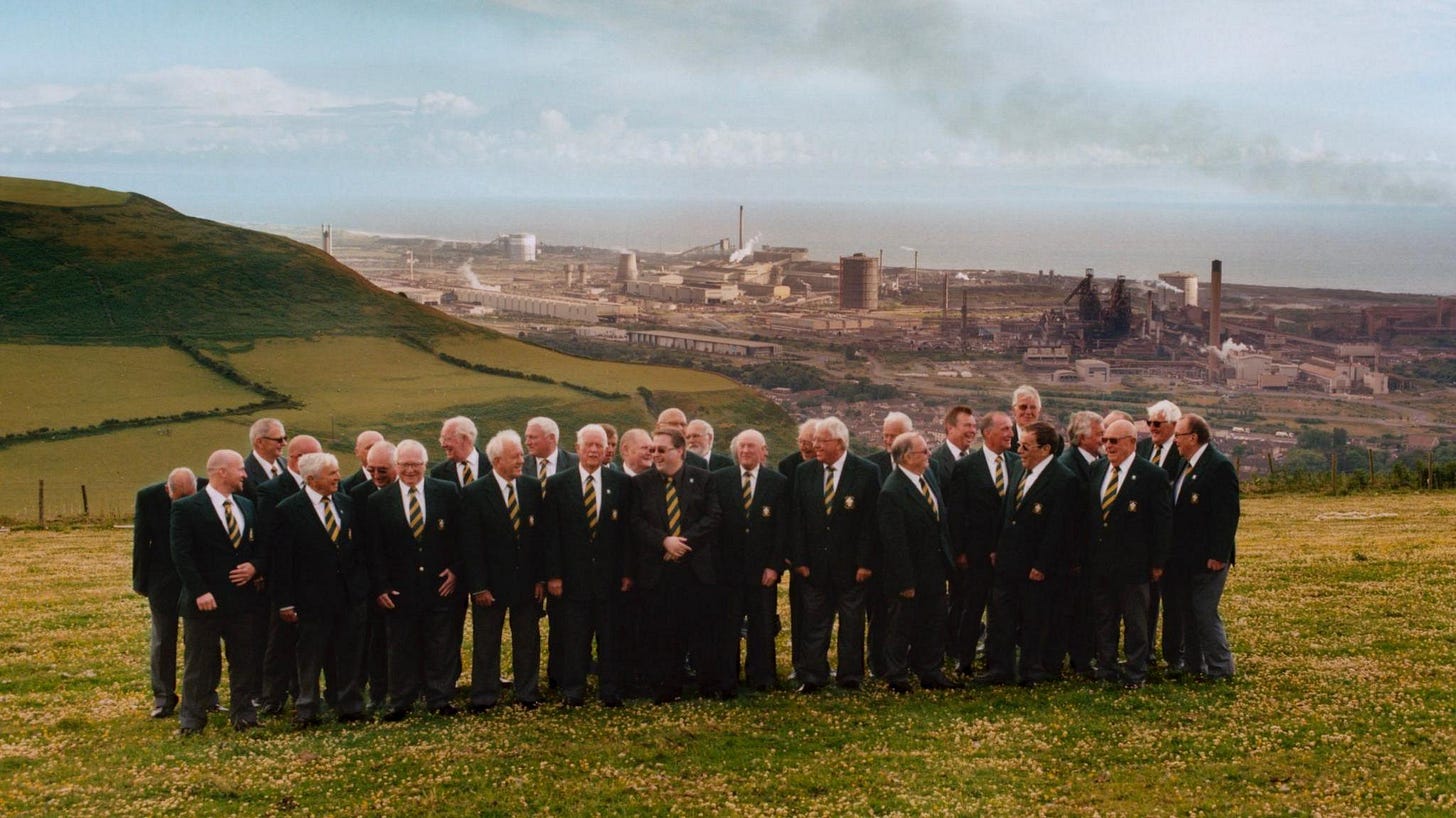
PART TWO
So, gear change. Should we all be a bit more…pagan?
In December 2023, I got one-shotted by this:
I think being open to magic and mysticism is a pretty good way to offset the cold logic of production and retain/protect life’s poetry. More importantly, it’s a choice to suspend disbelief. Someone once asked if I believe ‘truth seeking (≈ rationalism) and purpose seeking (religion, woo, lore) are compatible?’ That’s exactly what I want to synthesise. Holding ‘we made rocks think’ in your mind, just long enough to get the epiphenomenal enchantment from it, is actually about agency. Let yourself hallucinate a little, detach from reality and leverage the different logic of latent space, where rationalism doesn’t apply and proof doesn’t matter.
Science and secularism are all well and good, but we must not lose the myth and magic. Again, I’m not (yet?) religious, but I think the Church reformists have it right on this:
“the Church has been encouraged to [replace] the glorious other-worldly mysticism of saints and angels…Jesus has been transformed from the Lord of Heaven and Earth, and the Judge of All, to my best mate, with all the gravitas of a crisps advert…Christianity needs to get just a little bit more weird and badass. More Caravaggio, less pastel. The Church exists to address the great mysteries of life — death, life, forgiveness, fear, passion, hope.”
We can find a secular form of this transcendent weirdness in ritual, poetry, folklore and the surreal, while still celebrating engineering and rationalism. But so far, no one has woven these features into a project of national purpose and progress. So let’s try.
Sovereign Albion synthesises all of these strands. It’s a world where science and tech progress coexists with a deep connection to the lore and the land and we encourage new rituals to restore our sense of higher purpose. It’s a place where rocks think and science is magic. It’s somewhere you can find meaning and purpose beyond religion, in secular third spaces, silicon wafers and the natural world: dancefloors, saunas, mountain summits, hot springs, pubs, bothies, libraries, cairns, stone circles, stadiums, lab spaces, crashing tides, choir halls, chip fabs, and permanent exhibitions. It’s a Britain not only rooted in the empirical rhythms of the natural world, but perhaps also the supervenient nourishment and guidance anchored around the wheel of year…just without the degrowth-y associations that usually go with that.
I grew up in the North West, so for a long time I was extremely sceptical that the South could compete with the beauty of the Lake District, the spirit of the Welsh mountains or the drama of the Scottish Highlands. But one simple psyop I’ve used — it’s really not that deep — is just being more intentional about travelling around Britain and going deep into the lore and culture of the places you visit. If you like to listen to the music or read the literature of wherever you’re visiting when you travel, did you know you can do that for Britain too? I dare anyone to listen to Cornwall, My Home and not be roused and/or become a Cornish independence sympathiser. You can just try on new rituals (a lesson I learned after reclaiming German citizenship yet finding myself knowing none of the customs).
The moody Tors of Dartmoor, the mysticism of Cornwall, the ceremony of Lud’s Church, the idyll of deep England in the Cotswolds and beyond — all of these places have their own mythic charm. I genuinely believe Britain is one of the most beautiful places in the world, and not enough people know it. Yes, I’m biased. That’s the point.
If Britain is an immersive experience, then Albion is its open world game:
it has main quests: progress & purpose
it has sacred sites to recharge: not just traditional places of worship or even ancient ruins, but secular third spaces too
it has game mechanics: seasonal cycles, resource management balancing progress with preservation, and multiple play styles (builder, guardian, etc.)
it’s rich in background lore and wisdom
Yes, it’s speculative, but it’s hyperstitial: sometimes you have to throw out the future in front of you and then catch up to it. Founders and artists use this sort of venturi effect all the time. We can all learn from their ability to create something out of nothing and build the futures they want to live in. You too can just build worlds!
Maybe my own personal experience won’t generalise. But as my partner says, the resurgence of i) tradwife cottage core simplicity, ii) horoscope girles and modern spiritualism, and iii) BRAT/hedonism creates creates fairly fertile conditions for this :)
If so, maybe the land and nature can be sources of non-rivalrous patriotism. By focusing on something we can all connect to, we can escape much of the dominant zero-sum, contested criteria for national belonging and rebuild a collective foundation for progress.
Sovereign Albion is just a playful idea, a useful device to project onto that I hope to keep working on. But national renewal is a necessity.
Here are some practical things I’d love us to actually do, and which I think could help restore a wider, intentional sense of national purpose:
Fine-tune an LLM on Britain’s founding myths, fables and tales to generate sermon-style guidance for making sense of a chaotic world and integrate connection to nature with science and tech progress; I mocked up a websim prototype here
Massively expand National Parks and rewild major swathes of the UK to enable much better biodiversity; then set a presumption in favour of planning approval everywhere else
Establish the Right to Roam across England and Wales, to restore access even if not ownership to our lands
Restore Stonehenge to its original design and ensure people approach up the Avenue (the hill up to the front entrance), to build the anticipation and wonder as in the Turner painting above, rather than English Heritage just inexplicably dropping you off in a bus at the back
Also install mini, Stonehenge-inspired trilithons across the country, akin to mini Shinto Torii you see across Japan [N.B. We have a lot to learn from Shintoism! But this piece is already mashing too many ideas together.]
Build new media platforms & idea machines to tell stories by, for and about Sovereign Albion
Reshore sovereign capabilities and industrial supply chains where possible via automation
Move the New Year and align the clocks changing to the Spring Equinox, to heighten celebration of the changing seasons
Get the BBC and HBO to commission a massive new TV series retelling the Arthurian tales, co-directed by Robert Eggers and David Lowery
Build & support more third spaces and ‘secular cathedrals’ across the country, built with British materials: should include some new, dedicated formats for secular congregation, contemplation and focus, but also more bathhouses, saunas, dancefloors, bothies, libraries, cairns, stone circles, choir halls, etc.
Restore Britain’s ancient kingdoms as part of a new federal state, or at minimum rebrand local authorities to resurface their ancient roots, in lieu of your latest municipal conurbation’s pallid aesthetics
Make Jerusalem the English national anthem
Clean up Britain’s chalkstreams and waterways
Build new towns and cities using Create Streets design codes, so we build with beauty by default
Offer a Bildungsroman bundle to every 18-year-old (instead of pretending we’ll bring back national service), to include: a UK-wide interrail pass, the right to use a student loan for purposes besides higher education, a premium Ordnance Survey app sub, a calendar displaying both the wheel of the year and dates of major British invention, a leylines map, and free entry to any National Trust, English Heritage site / a tour of any factory or lab space for a year
Create new chivalric orders both for innovation (see this proposal) and stewardship of the British wild
Adopt ‘progress, land, spirit’ as our national motto
The Sovereign Albion Starter Kit:
Until the last couple of years, I hadn’t really come across the word ‘Albion’ except for a) football teams and b) the VC fund. Honestly, I’m probably misusing it (e.g. I very much intend to include Scotland, Wales and Northern Ireland in this imaginary). But I’ve since read/listened to a lot that talks about Albion, in particular Zakia Sewell’s My Albion documentary, which explored the songs and symbols of British folk culture and her own place (being of both Caribbean and British descent) within it. It’s really worth your time, and I’m eagerly anticipating Zakia’s book on the same topic.
One of many, many takeaways I had from My Albion is that there is new folk art and culture being created all the time. Unfortunately I couldn’t shoehorn all of it into this piece, but I want to include at least a handful of further recs, which I’ll try to add to/organise further when I get chance. I haven’t focused here on wider science/tech/progress recommendations, as they are well covered elsewhere. But do read the Karp book when it comes out. I’d love to hear your suggestions too.
I also feel enormously grateful to several people in my life who have not only let me bang on about so much of this for nearly 2 years, but helped me think through how it all fits together.
So, alongside all the links above, the starter kit:
Land, folklore and Britain
There’s a beautifully weird connection between Charlie Cooper (This Country, Myth Country) » Mortimer & Whitehouse Gone Fishing » Zakia Sewell’s DJ sets and documentaries » and everything Weird Walk publishes. Go deep in them all.
The same is true of Wolf Hall » Mark Rylance » Mackenzie Crook » Detectorists » Johnny Flynn » and basically anything Robert Macfarlane touches but especially the Lost Words / Spells
Nan Shepherd’s The Living Mountain
Richard Powers’ The Overstory
Amy Jeff’s Storyland, a new mythology of Britain weaving together diverse stories and legends including prehistoric stories, the Brute Chronicles and many Geoffrey of Monmouth tales for the modern reader
Wild Service, which explores a radical environmental politics to inspire greater stewardship of, and connection with, nature; compiled by Nick Hayes who leads the Right to Roam campaign
Oliver Smith’s On This Holy Island, which chronicles a modern pilgrimage across Britain visiting religious sites, standing stones and music festivals
All of these cinematic mossy quests, but particularly The Green Knight
Merlin Sheldrake’s interview on Rick Rubin’s Tetragrammaton
Guy Shrubsole, The Lost Rainforests of Britain
Every seasonal restaurant ever, Julius Roberts, the Mainly Breakfast calendar
Taboo, the TV series with Tom Hardy that inexplicably refuses to deliver on a promised second series
Wild Isles, the BBC Attenborough documentary about Britain
Scout Studio’s The Cull, The Eagle with the Sunlit Eye, and The Pine Hunters
Stormzy’s Glastonbury set
The new chapels, aka spaces for focus and flow state located around the country: Ashore, Unyoked, Unplugged
Cornwall, My Home, by The Fisherman’s Friends. See also Scout Studio’s Men Are Singing short, about a Cornish men’s choir
Carry Them With Us, an incredible album by Scottish small pipes player Brìghde Chaimbeul (who also plays on Caroline Polachek’s Blood and Butter)
George Orwell’s The Lion and the Unicorn, and David Runciman’s Past Present Future discussion of the hypocrisy of English nationalism
Roy Hattersley’s In Search of England
This thread exploring Britain’s founding myths
Meaning & worldbuilding
Mat Dryhurst & Holly Herndon’s The Call, a remarkable exhibition exploring the new aesthetics, rituals and protocols we might want to nurture for the AI era
Elijah’s Close the App, Make the Ting, and his critique of BBC 1Xtra
Alastair Monty’s proposal for the TxP Progress Prize to use non-invasive neuromodulation for ‘a weekly gathering that’s somewhere between a church service, Glastonbury, meditation, and an excursion with your friends’
See also Prophetic AI, a US startup working on non-invasive neurotech to induce lucid dreams and expand consciousness / the human experience
Byung-Chul Han’s Psychopolitics and The Disappearance of Rituals
Simon Critchley, On Mysticism: The Experience of Ecstasy, and his interview on Vox’s How To Feel Alive
The Search Engine podcast in general, but particularly:
Softer Futures » Ida Lissner » Mat Collishaw » Ithell Colquhoun
Sarah Drinkwater, The best companies build worlds
Compound VC’s Time Since Launch clock
FT: Skimming, scanning, scrolling — the age of deep reading is over
1961 NYT Review of Arthur Koestler’s The Lotus and the Robot, which discusses the spiritual shortcomings of the West’s science and technology revolution and the search for enchantment from the East

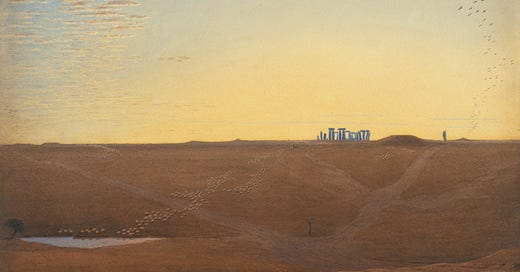



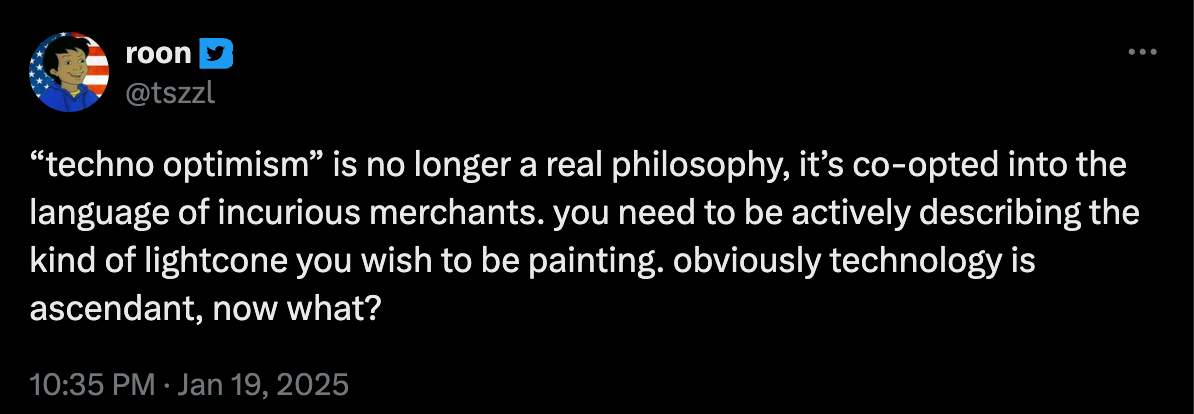

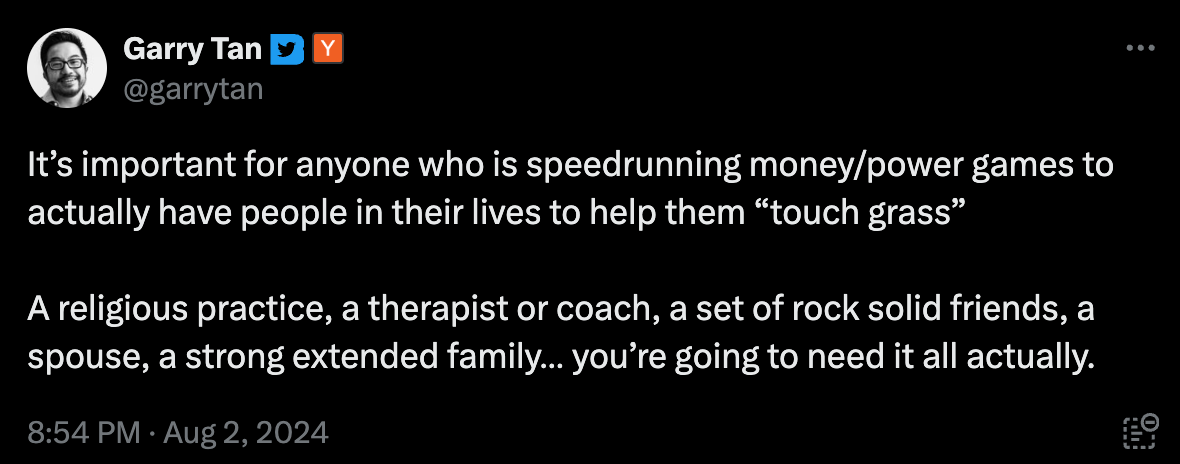

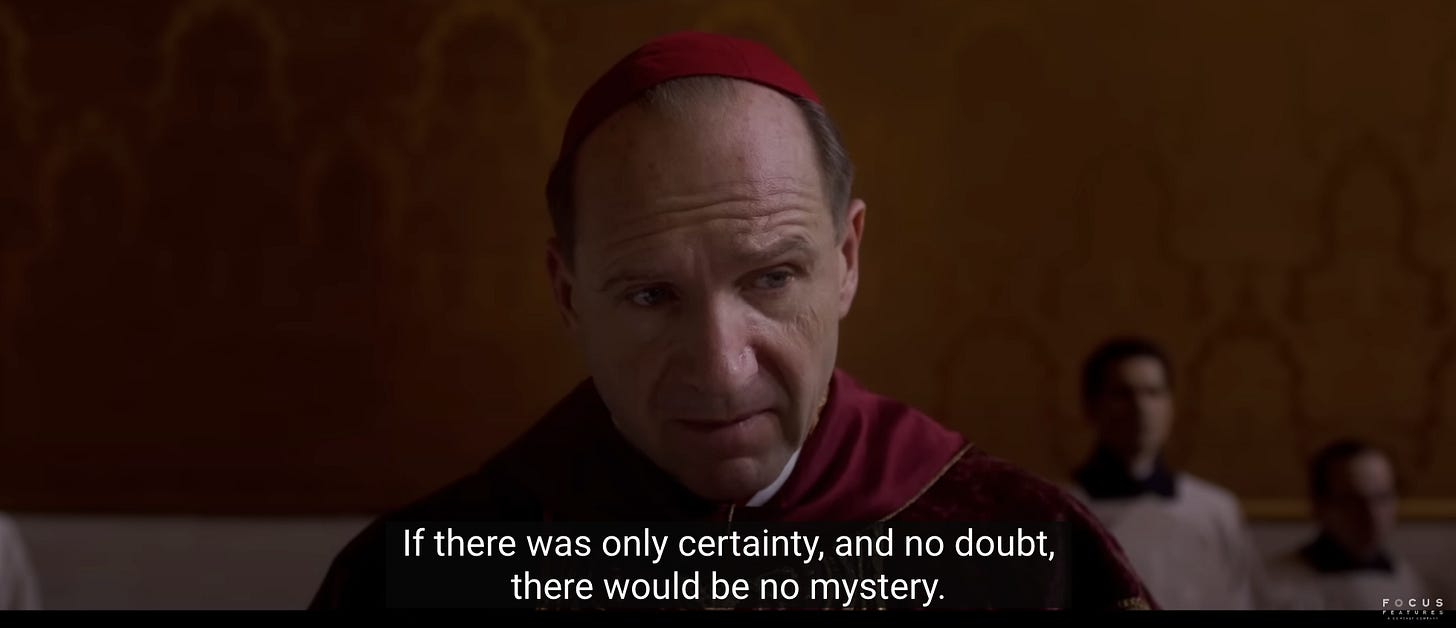
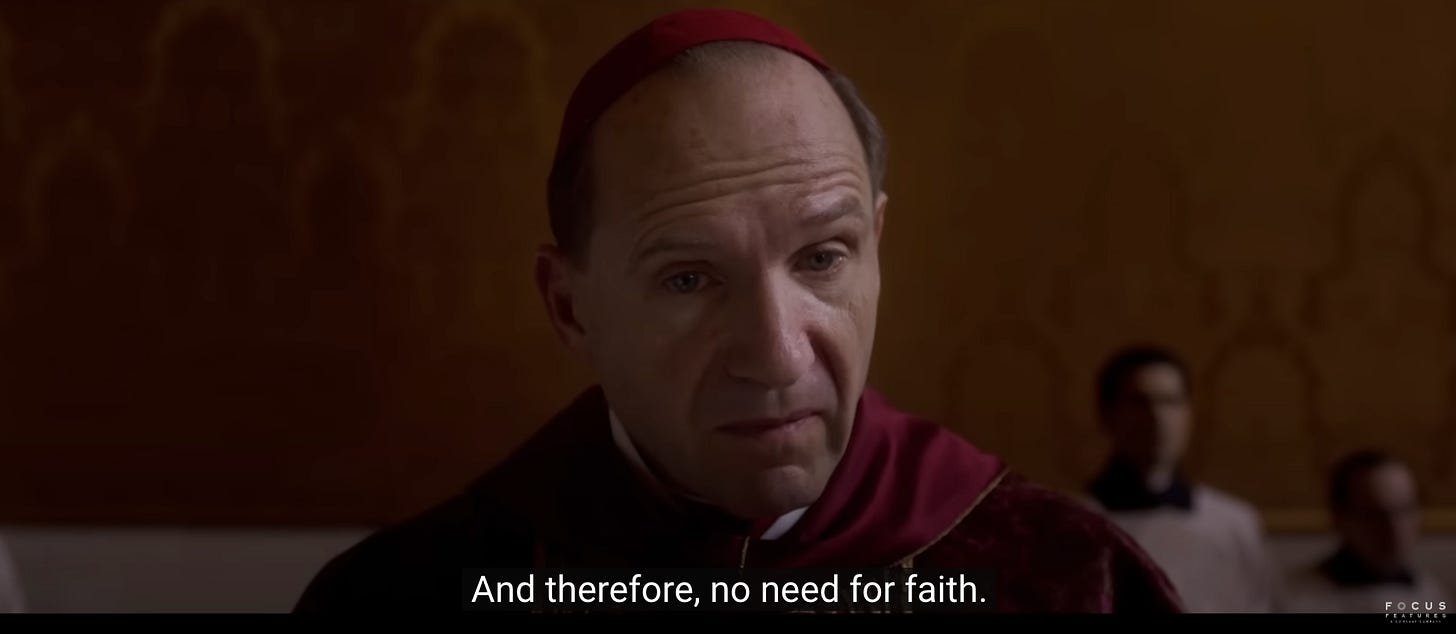
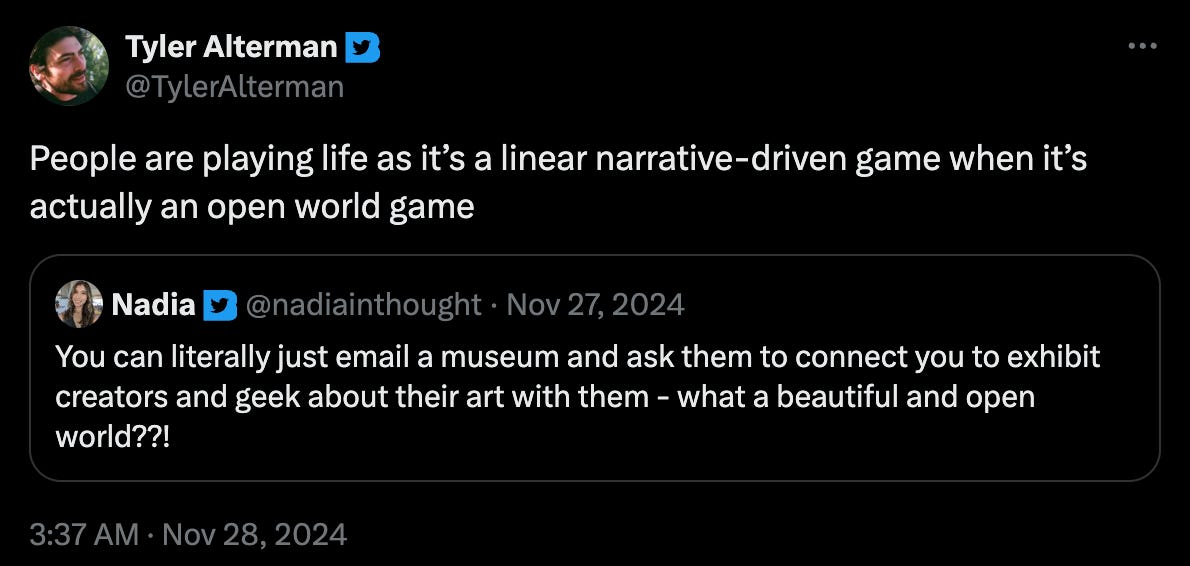
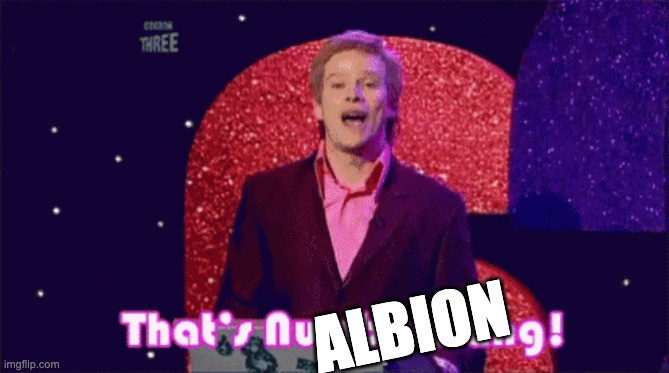
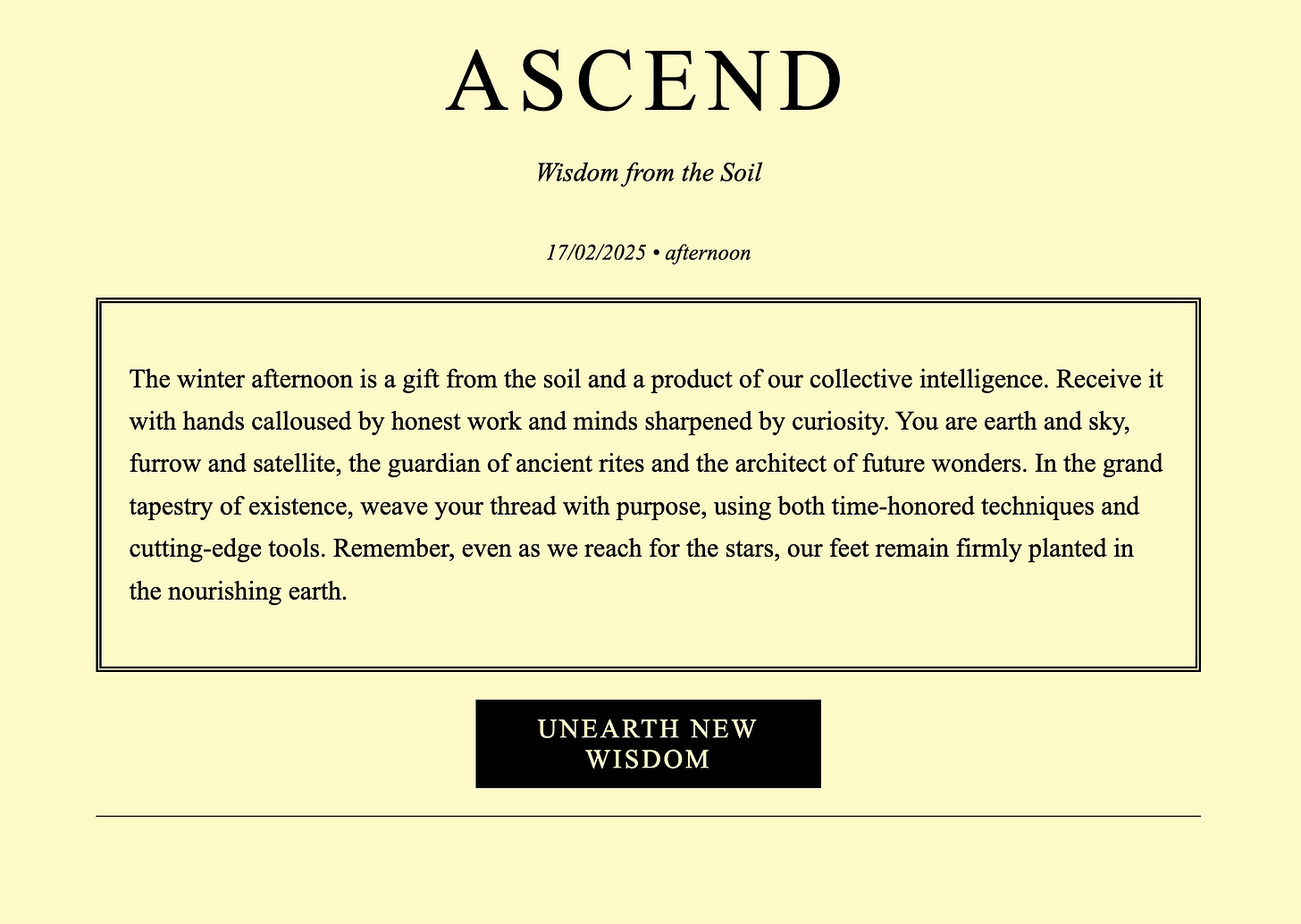
this was a delgihtful read -I wonder if you’re familiar with the Weber/Schiller/Charles taylor narrative on disenchantment/reenchantment